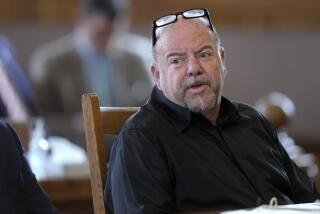Filings Show ANC Was Warned on Cellular Ads
- Share via
Lured by ads promising a “once in a lifetime opportunity to acquire great wealth at a minimum investment,” about 4,800 customers paid between $5,000 and $150,000 to a Century City firm for a chance to win a cellular telephone franchise in a federal lottery.
But before any of its customers could win a franchise, the Federal Trade Commission went to court last month to shut down the company, claiming that American National Cellular’s sales pitch failed to disclose the high risks associated with the lottery.
With television personality Mike Douglas acting as its spokesman, ANC grossed about $20 million before U.S. District Judge William Rea in Los Angeles ordered ANC into temporary receivership last month.
While the potential market for mobile telephone systems amounts to billions of dollars, most cellular franchisees will lose money at first--a point glossed over in ANC sales literature and television commercials, according to the FTC’s lawsuit.
ANC, which sold its services through 148 brokers around the country, claimed to be the largest cellular telephone application company in the United States.
Meanwhile, company officials, under the supervision of the court-appointed receiver, have promised to make sure that the remaining lottery applications will be completed and forwarded to the FCC before the February lottery deadlines.
ANC’s abrupt closure apparently came as no surprise to the firm’s public relations consultants, business associates and attorneys who repeatedly warned company executives that the marketing program was misleading, according to documents filed in federal court here.
And, before the federal action, officials in Arizona and Massachusetts filed complaints against ANC for allegedly selling unregistered securities, according to court records.
ANC’s advisers repeatedly warned ANC President Michael Godfree that the advertising pitch could cause serious problems, the documents show.
“Continuation of ANC’s selling efforts would expose the company and its officers to criminal prosecution for fraud,” wrote Ian D. Volner, a Washington attorney, in a July 15, 1985, letter to Godfree that is part of the court record.
“The overall tone of the advertising copy could be viewed as being exaggerated, promising too much, implying that there is little or no risk involved, and quick return on your money if you should win the lottery,” said a Sept. 9, 1985, letter to ANC officials from Len Lipton, an account executive at Los Angeles-based Carl Byoir Associates, a public relations firm.
“We suggest that ANC avoid the copy ‘very rich’ because it may suggest that the tone of the ad is a ‘get-rich-quick’ kind of scheme,” Lipton wrote. A spokesman for Byoir Associates said the firm worked for ANC only briefly, after the cellular company had sought advice.
ANC was primarily a marketing company that contracted with Satellite Systems Engineering of Bethesda, Md., to complete the detailed, technical lottery applications.
To enter the lottery, people must first prove they have the financial and technical ability to operate the system. The applications must also include site plans for switching centers and detailed descriptions of the low-power antennas and other equipment used to handle simultaneously hundreds of mobile telephone calls.
Bill Pritchard, president of Satellite Systems, a consulting engineering firm, said the government’s action against ANC has had a “very deleterious effect on our company.”
Contractor Earned $3 Million
Satellite Systems earned about $3 million in revenue from its exclusive contract to prepare lottery applications for ANC, Pritchard said in a recent telephone interview.
“We will complete all our work for the applications we have” and turn them into the FCC, Pritchard said. “In the long run, the people will get something, they won’t be cheated or defrauded.”
Pritchard admitted that he was among those warning ANC about its overzealous advertising campaign but said ANC had accomplished “a startling bit of entrepreneurship.”
FTC attorneys estimate that ANC and other application firms collected about $40 million from customers interested in entering the lottery. In June, the commission issued a warning to the public claiming that the promises made by the application firms “may be fraudulent and are certainly misleading.”
To be fair in distributing the licenses, the commission divided the country into various markets. In each market, there are two licenses for cellular systems; one goes to the local telephone company and the other is up for grabs. The application deadline for a second round of the cellular lottery is next February.
Lottery applicants are free to file their own applications, of course, but as with many government-sponsored lotteries the procedures can be complicated and some people decided to get help.
Capitalizing on that demand, ANC put together an aggressive television and newspaper campaign featuring Douglas. Callers who responded to a toll-free number were referred to ANC brokers in their area, according to court records.
In the commercials, Douglas suggested to potential customers that they learn how to “become very rich in the billion-dollar cellular mobile telephone industry,” the court documents show.
“I have no comment,” Douglas said in a recent telephone interview. “You’ll have to call and talk to them.”
According to Chuck Johnson, an assistant Arizona attorney general, ANC is believed to have paid Douglas $25,000 and to have promised him at least $25,000 more.
Arizona Filed Complaint
In August, Arizona’s attorney general filed an administrative complaint against Douglas seeking the return of the money he was paid. It also filed a civil suit against the officers of ANC. The suit alleges that, by filling out the applications for clients and making representations about success in the lottery, ANC violated laws prohibiting sales of unregistered securities through unregistered dealers. ANC has denied any wrongdoing.
Arizona was not alone in taking action against ANC. On Sept. 30, the Massachusetts secretary of state issued a temporary cease-and-desist order against the company, alleging fraud and the sale of unregistered securities. And on Aug. 7, the California Department of Corporations issued subpoenas for company records, to which the company failed to respond, according to the FTC complaint.
Company officials could not be reached for comment or referred all inquiries to their attorneys. Steven Revitz, a Los Angeles attorney representing executives of ANC, said that, although ANC is fighting the receivership, the company has little hope of going back into business because the FTC action has “probably done so much damage publicity-wise.”
According to the receiver’s report filed in court, $16.6 million in application fees were collected by ANC between May 1 and Sept. 30, 1985. About $5.4 million was paid for commissions, $2.1 million for marketing expenses, and $4.6 million for other expenses. Included in other expenses were $3.6 million in professional fees paid to company officials.
“The real question is, where is the money?” said George Schulman, an FTC attorney in Los Angeles.
ANC’s attorney insisted that all company funds will be accounted for. A hearing on the receivership and government’s request for a preliminary injunction is set for Jan. 14 in federal court in Los Angeles.
More to Read
Inside the business of entertainment
The Wide Shot brings you news, analysis and insights on everything from streaming wars to production — and what it all means for the future.
You may occasionally receive promotional content from the Los Angeles Times.










